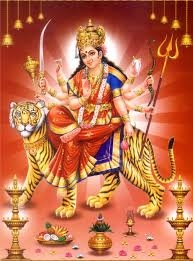Shakti


In Hinduism, Shakti also spelled as Sakthi, meaning "power" or "empowerment" is the primordial cosmic energy and represents the dynamic forces that are thought to move through the entire universe. As the mother she is known as Adi Parashakti or Adishakti. On the earthly plane, she most actively manifests through female embodiment and creativity/fertility, though it is also present in males in its potential, unmanifest form.
Hindus believe that she is both responsible for creation and the agent of all change. Shakti is cosmic existence as well as liberation, its most significant form being the Kundalini Shakti, a mysterious psychospiritual force.In Shaktism, she is worshipped as the Supreme Being. She embodies the active feminine energy of Shiva and is identified as Tripura Sundari or her avatar Parvati.
David Kinsley mentions the "shakti" of Lord Indra's as Sachi (Indrani), meaning power. Indrani is part of a group of seven or eight mother goddesses called the Matrikas (Brahmani, Vaishnavi, Maheshvari, Indrani, Kumari, Varahi and Chamundi and/or Narasimhi), who are considered shaktis of major Hindu gods (Brahma, Vishnu, Shiva, Indra, Skanda, Varaha/Yama and Narasimha respectively).
The Shakti goddess is also known as Amma (meaning 'mother') in south India, especially in the states of Karnataka, Tamil Nadu, Kerala, Telangana, and Andhra Pradesh. There are many temples devoted to various incarnations of the Shakti goddess in most of the villages in South India. The rural people believe that she is the protector of the village, the punisher of evil people, the curer of diseases, and the one who gives welfare to the village. They celebrate Shakti Jataras with great interest once a year. Some examples of incarnations are Ganga, Kamakshi, Kanakadurga, Mahalakshmi , Meenakshi, Manasa, Mariamman, Yellamma, Poleramma, Gangamma and Perantalamma.